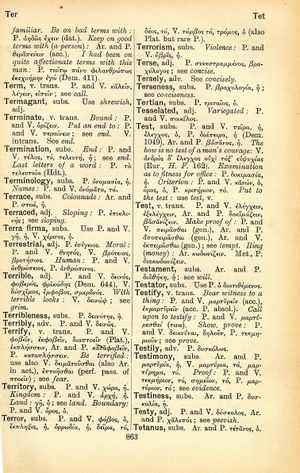testator
δυοῖν κακοῖν προκειμένοιν τὸ μὴ χεῖρον βέλτιστον → the lesser of two evils, the less bad thing of a pair of bad things, better the devil you know, better the devil you know than the devil you don't, better the devil you know than the devil you don't know, better the devil you know than the one you don't, better the devil you know than the one you don't know, the devil that you know is better than the devil that you don't know, the devil we know is better than the devil we don't, the devil we know is better than the devil we don't know, the devil you know is better than the devil you don't
English > Greek (Woodhouse)
substantive
Use P. ὁ διατιθέμενος.
Latin > English (Lewis & Short)
testātor: ōris, m. testor.
I One who bears witness or testifies to a thing, a witness (very rare), Prud. Cath. 12, 85.—
II One who makes a will or testament, a testator (the predom. jurid. signif. of the word, but not in Cic.), Dig. 28, 3, 17; 31, 1, 89; Suet. Ner. 17; Lact. 4, 20 al.
Latin > French (Gaffiot 2016)
testātŏr,¹⁶ ōris, m. (tester),
1 celui qui rend témoignage : Prud. Cath. 12, 87
2 testateur : Suet. Nero 17 ; Dig. 38, 3, 17.
Latin > German (Georges)
tēstātor, ōris, m. (testor), I) der Zeuge, Prud. cath. 12, 87. – II) der Testierer, Testator, Suet. u.a.
Latin > English
testator testatoris N M :: testator; one who makes a will; witness, one who testifies (L+S)

